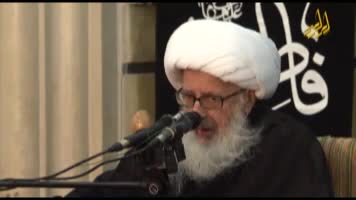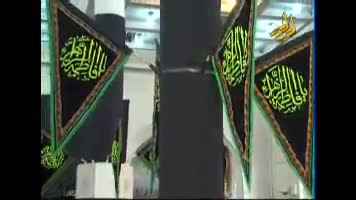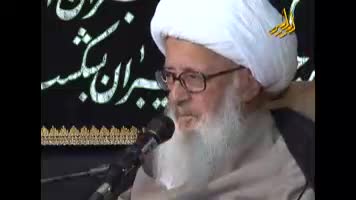the Most Beneficent, the Most Merciful. All praise belongs to Allah, the Lord of all the worlds, and may the salutation of God be upon our master Muhammad (P.B.U.H.) and his blessed and pure progeny, especially upon the Remainder of God on earth (A.J.). And may their enemies remain deprived of God's mercy till the day of judgement. The discussion revolved around the conclusion regarding what is undrstood from the verse of "Purity" (Al-Ahzab:33) The result of the past discussion can be summarized in the following sentence: According to the authentic tradition of the Seal of the prophets (P.B.U.H.) The sadness of Fatima Zahra (A.S.) is the sadness of the Prophet (P.B.U.H.) and the felicity of Fatima Zahra (A.S.) is the felicity of the Prophet (P.B.U.H.) and in accordance to the word of God in the Holy Book: "and whatever the Apostle gives you, accept it" (Al-Hashr:07) All the Islamic sects, without considering the differences that exist between the various schools of thought, must mourn (the martyrdom of) Fatima Zahra (A.S.) to an extent equal to the greatness of this tragedy, and this matter is not merely a matter of obedience. Without taking into consideration the various schools and sects, it is a neccesary requirement of our faith in God and our faith in the Seal of the prophets (P.B.U.H.), (that too) by way of authentic prophetic tradition, that we revive the Fatimi slogans. The result of this discussion is that Fatimiyah (the period that marks the martyrdom of Hazrat Fatima Zahra) is not exclusive to the Shi'a alone. In fact, it belongs to every individual who believes in the Quran and the tradition of the Prophet (P.B.U.H.). Automatically, (he) must be sad when the Seal of the prophets (P.B.U.H.) is sad, and must be happy when the latter is happy. This is a matter from amongst matters wherein the "deduced results are always accompanied by the matter itself". Nevertheless, the responsibilities that fall upon the shoulders of two groups are much weightier than others: One (of these two) is the responsibility of the scholars and the elite of the Muslims who have with themselves the knowledge of the Book and the prophetic traditions. (they) know the fact as they truly are. Automatically, the responsibilty of this group is much weightier (than that of others) Second (from amongst these two) are those who have a lineal relationship with the Sadiqa-e-Kubra (Hazrat Fatima) (A.S.) and are counted from amongst her descendents. This group, too, bears a special responsibility which must be made clear. As for the greatness of this tragedy: By presenting the tradition that exists within the Shi'a, just one narration (dealing with this matter) shall suffice herein: As the Fatimi days of mourning are upon us, they begin from tomorrow (the 13th of Jamadi-us-Thani) and end on the 3rd of Jamadi-us-Thani. Ceremonies and gathering, all across the nation, must become inundated with the mention of her virtues, her merits and that which befell her. This is a neccesary obligation upon every Muslim. Especially those who follow this particular school of thought. The traditions that have reached us via Shi'a narrative transmissions, just one (of them) suffices, and that tradition is this: Ubay, from Abi Mahboob, from Ibn Ri'aab, from Abi Ubaydah, from Abi Abdillah (A.S.). From a jurisprudential point of view, such a narrative chain represents probative truth for the likes of Sheikh Ansari in all matters concerned with important juristic issues. (It bears) a bare minimum of transmitting intermediaries which is an important criterion for increasing the authenticity of a narration's veracity. This is the first aspect (of the said narration's strengths) The second aspect (is this): the state of these transmitters (involved) in terms of their character and the traditions narrated by them. The transmitters of this tradition are all (men of) unflinching credibility and dependability (and their credibility) is established upon the word of the earliest companions like Sheikh and Najashi. One person is (deemed) credible by way of the guarantee of Aa'mif that too, a general guarantee by Sheikh Toosi in Idah, and by Ali Ibn Ibraheem in his exegesis. The transmitters of this tradition bear such attributes. The text of the tradition is this: "From Abi Abdillah (A.S.) that he said: The Prophet of God (P.B.U.H.) would …" this "would" (the arabic Kaana) represents perpetuality and continuity. "The Prophet of God (P.B.U.H.) would…", (this means that) his perpetual habit was such and that (the occurrence in question) was not coincidental. "The Prophet of God (P.B.U.H.) would kiss Fatima (A.S.) abundantly and Aisha would criticize this (act), so the Prophet of God said: O' Aisha! When I was tken by night to the heavens (and) entered paradise, and Jibraeel took me close to the tree of Tooba, and presented me with fruit from that tree and I ate it". The importance of this tradition is such that (according to it) the very constitution her (Fatima's) body must come into effect in a position (defined by this statement of the Holy Prophet): "I was received as a guest in the proximity of my Lord, and (therein) He provided me with nourishment". These realities are awe-inspiring, but not for everyone, (they are such) only for those individuals who comprehend the greatness of this nocturnal ascension, and understand the proximity that took place that night, and are able to grasp what the tree of Tooba really is, and what its characteristics are. A tree that is such that there exists not a single palace from amongst the palaces of the prophets in heaven except that it has in it a piece from the roots of this tree. From such a tree was constituted the seed that became the source of her bodily creation. After this, he said: "I came back to the earth, and God gave me Fatima (A.S.) from the fruit of that tree", The statement of the Noble One (P.B.U.H.) is this: "...therefore, never have I ever stopped kissing her…", never ever … it has never happen that I kissed her and did not sense the sweet odour of the tree of Tooba. Someone whose body is such, what must her soul be like? Here lies a lengthy discussion. A deep discussion regarding the relationship between the body and the soul, and the proportionate relationship between soul and the body, keeping in mind these intricacies. If the body be from the tree of Tooba, and the source of the physical form be from that place, then where must the source of the soul be from? If the body is such a body, a soul that exists within such a body , what a soul that must be? These are the matters that when their reality is illuminated the meaning of this statement by the Sixth Imam (A.S.) become some what clearer: Why was Fatima named Fatima? (The word) Fatima is from the root Fatim meaning "to be cut off". He said: "Fatima was named Fatima because all of creation is cut off from understanding her". (God) has cut off the human intellect from comprehending her real position. The reason is this: If the body is such, if the source of the physical form is taken from the highest of the highs, where must the source of the soul be from? From here we understand what the Sixth Imam (A.S.) meant (when he spoke about) what her soul was created from: (Her) body is from the tree of Tooba but (her) soul is from the luminance of God's glory. This is the source of the soul: "From the luminance of God's glory" Here the pen held by any writer breaks (he is rendered speechless), (and) the words of all jurists and philosophers are transformed into stammerings (due to the intensity of their astonishment). The body from the tree of Tooba, the soul from the luminance of God's glory. And then, this body is placed into the earth in the darkness of night, and the greatest nobleman of existence stands beside this body and says: "I wish I were not alive to see this state of affairs". How should this event be revived? Herein, the most important facet is the responsibility of Fatima's descendents. This is the second part. Fatima's descendent, all those who are true descendants… The title of a "true descendent" also applies to those individuals who are Fatimi from their maternal side. Such an application is by decree of the Quran: "and of his descendants" (Al-A'naam:84). (this verse) is evidence of this fact. One's progeny is not limited to descendants that are born from male children, but descendents born from female children are also included in one's progeny, Therefore, firstly, all those who are paternally Fatimi, and, secondly, all those who are maternally Fatimi, must (come out) on martyrdom's eve, which corresponds with the 3rd of Jamadi-us-Thani, when night falls. This year, it has been established that special lamentation groups consisting of the Saadat must come out in mourning on the eve of this martyrdom, and must carry out their responsibilities vis-à-vis their mother. Here two matters exist: One (of them) is this that Sheikh Sadooq, in the book Ayoon, has narrated a tradition. The subject matter of this tradition is such: "Looking towards the faces of the Hazrat's progeny is worship" Where has this statement originated from? Looking towards the Kaa'ba is worship' Looking towards the codex (the Quran) is worship, Looking towards a scholar is worship, Looking towards the face of a Fatimi, who merely enjoys a hereditary linkage with her, is (also) worship. So it was asked of the Eighth Imam (A.S.), that if looking (towards him) was worship, (was the meaning of this tradition) looking towards the Imams from her progeny? The Imam's statement is that (the meaning of this said tradition includes) looking towards every individual from her progeny. This means that a syed who comes 14 hundred years after her, looking towards him is also worship. This is one tradition. The other tradition exists within the book Aamali by Sheikh Sadooq. The tradition is this: On the Day of Judgement, darkness shall cover every thing, once this darkness has covered everything, suddenly a group of lights shall emerge, the people shall be astonished (and will ask themselve) who these people are? Are they angels? Are the prophets? Are they martyrs? A caller shall call out: "They are not prophets, they are not martyrs, they are the progeny of the Seal of the prophets (P.B.U.H.)" In every syed, who bears within himself these two characteristics, one: he must not have exited from the path of the Prophet (P.B.U.H.), two: the stain of sin must have polluted his life, for such a syed, it becomes worship to look towards his face in this world, (and) on the Day of Judgement he shall enter the hereafter submerged in luminance. But all of this is due to whose blessings? We must find the root. The male and female Alawi Saadat, the descendents of the Prophet (P.B.U.H.) who (belong to a lineage) that is exclusive to the Saddiqa-e-Kubra (A.S.), and this fact itself is from amongst the great wonders of the world, why have these people (the Saadat) reached such a state? What is the source of this distinction? Its source is this: When (Hazrat Zahra) passed away and it can not be mentioned, they - no one was at home except Asma. She bathed her body. Lets summarize…ok. then the two sons arrived, they asked: Asma, what happened to our mother? They both ran towards the grave of the Prophet (P.B.U.H.) wailing in grief: "O' Ahmad (P.B.U.H.), O' Muhammad (P.B.U.H.)". The moment they entered the mosque… that which breaks one's back is this: Who is Amir-ul-Momineen (A.S.)? He is someone whose body carried with itself a thousand sword wounds, (but) for none of these wounds did he ever utter a single word of pain, but when he saw these two children, he fainted on the spot. Now, What situation did (this loss) create? The exact text is this: They sprinkled water on his face, he was lying flat on the floor, then he stood up again, (he) came, entered his home, when he entered the house, he raised the veil from on top of her face. The critical point lies herein: "then he removed the veil from her face, (and) then (he found) a piece of paper near her head then he looked upon the piece of paper (and found this) therein: In the name of Allah, the Most Beneficent, the Most Merciful. This is what Fatima the daughter of Muhammad (P.B.U.H.) wills, She wills and her will is this, that she bears witness that there is no deity but Allah, and that Muhammad (P.B.U.H.) is His slave and messenger, and that Paradise is reality, and Hellfire is reality, and that in the Approaching Hour there is no shadow of doubt, and that Allah shall raise friom the graves. O'Ali ! I am Fatima … I am Fatima …" In (the statement) "I am Fatima" she says it all, and tells "who I am", What is my body? What is soul is? "I am Fatima the daughter of Muhammad (P.B.U.H.), God gave me in marriage to you, so that I may be with you in the world and the hereafter, you are superior to me than anyone except me, embalm me, bathe me and dress me in a burial shroud…but … at night", What was the matter? The embalmment, the bathing, the shrouding and the burial, were all to be done at mid-night. "and no one must know!" Then she said: "O'Ali, I leave you to God", meaning that your only friend, your solitary support, is no more. That was the last sentence… The Saadat must comprehend what their responsibility is. Firstly, the male and female Alawis, the male and female Fatimis, all across this country, you must enshrine the day of Hazrat Zahra's martyrdom on the 3rd of Jamadi-us-Thani. The mourning groups of the Saadat must come out independently (in lamentation) on the eve of this martyrdom, (and) the non-syeds must follow behind them. Why? Because there exists a message, some one has transmitted this message, and some one has acted as an intermediary for this transmission to take place. What is the message that has been transmitted to you? The ending of that will was as such: "And recite upon my children (my) salutations till the Day of Judgement" There is (great) meaning in these words. It means that you are to say to them: She was embalmed at mid-night, shrouded and buried, the responsibility of the elite from amongst the saadat is well-known. O' Lord, forgive us for the sake of the soul of Saddiqa-e-Kubra (A.S.), (and) grant us the attentions of her son, the Central Pole of Existence (Imam Mahdi) (A.J.).
The greatness of the tragedy of Hazrat Zahra's martyrdom, the position of her progeny, and their responsibility on the day of her martyrdom.
27 April 2010
۱۳ جمادى الأولى ۱۴۳۵
27 April 2010
00:41:35



